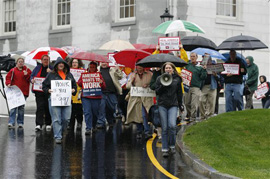| Home | Blog | Ask This | Showcase | Commentary | Comments | About Us | Contributors | Contact Us |

The mounting case for a Financial Transaction TaxCOMMENTARY | February 37, 2012With the EU almost sure to add an FTT, there is ample reason for America to follow suit – and for reporters to study the benefits and risks. The benefits are that an FTT would help stabilize financial markets. The risks are that it won't be done well. By Henry Banta The case for a financial transaction tax (FTT) has become almost overwhelming – particularly now that it is almost certain to be adopted in some form by the EU. A very small FTT would go far to discourage speculation and improve the stability of financial markets. It would also help reduce the bloated and excessively expensive financial sector.
The basic function of the capital market is to match savings with the investments that will give the greatest return to those savings. Financial institutions such as commercial banks, investment houses, brokerage firms, insurance companies, mutual funds and hedge funds accept money from people who have savings and invest them where they can get the greatest return.
That it be done well is essential to the capitalist system. By constantly seeking the greatest return the system insures that investment will be put to use most efficiently. In effect this promotes the efficiency of the system as a whole.
The problem with financial markets, however, is that they are inherently unstable – i.e., susceptible to periods of boom and bust. In his “General Theory,” J. M. Keynes famously noted that:
"Speculators may do no harm as bubbles on a steady stream of enterprise. But the position is serious when enterprise becomes the bubble on a whirlpool of speculation. When the capital development of a country becomes a by-product of the activities of a casino, the job is likely to be ill-done."
For a few decades our economic policy was largely dominated by those with the view that such instability was a myth. They argue that markets always accurately and efficiently assess risk and therefore accurately price capital assets; cycles of boom and bust really can’t happen and therefore never do. The academic world preached, and the political world put in practice, the teaching that the efficient market is generally self-regulating and needed only to be left alone. Regulation should be reduced to an absolute minimum.
During these decades the financial sector grew to immense proportions and became immensely profitable, in part by gambling with other people’s money. Deregulation had permitted financial institutions to construct increasingly complex financial instruments which were traded in highly leveraged transactions.
Between 2006 and 2008 reality rudely intruded into the world of financial markets. The unthinkable happened and the entire financial system experienced a massive meltdown. Speculation had turned the system into a casino with catastrophic results.
In a recent Tax Notes article (Jan. 23, 2012) Lee Shepard argued that the resulting meltdown demonstrates the need for an FTT. (Ms. Sheppard also briefly discussed the canard that the Community Reinvestment Act caused the financial meltdown – even though one suspects that most of those still under this delusion are probably in Kenya looking for a birth certificate.) The first casualty of the meltdown was the efficient market theory. Contrary to that theory, the meltdown demonstrated the inherent instability of financial markets.
Indeed, there is a long history of repeated boom and bust. There is a good reason why Reinhart and Rogoff’s monumental study of eight centuries of financial folly has the ironic title, This Time Is Different. That capital markets perform reasonably well most of the time does not mean they do so all of the time. The notion that they will always accurately assess risk is indefensible. Left to their own devices capital markets are able to morph into casinos where the players use other people’s money.
Bloated, unstable and deregulated financial markets were now exposed as dangerous. They have grown all out of proportion – too big and expensive for the function that they have ultimately performed badly. The government must have a major role in maintaining the stability of the capital markets, not only in its monetary and fiscal policy but in the direct regulation of financial markets. And, in event of a major meltdown, it is the government, by sheer default, that will have to clean up the mess.
With all that behind us, where are we now? In 2010 Congress passed and the President signed the Dodd-Frank Wall Street Reform and Consumer Protection Act. This act purported to reform, at least to some extent, almost every aspect of the financial services industry. This is not the place to review the extensive debate over the law, but rather to look at certain aspects of the present financial market and ask if we are now safer from any from any imminent financial disaster and ask whether a financial transaction tax is a simple measure that could make a significant contribution to the stability and rationality of the financial markets.
Taxing any kind of behavior does tend to discourage it – as we have learned from the various cigarette taxes.
Two sets of facts are relevant to the FTT question. The first involve the gigantic dimensions of the “swaps” market. In testimony before the House Financial Services Subcommittee Chairman Gary Gensler of the Commodity Futures Trading Commission noted that the swaps market exceeded $300 trillion. (A swap is a derivative in which counterparties exchange the cash flow of one party’s financial instrument for those of another party’s financial instrument. They can be used to hedge or to speculate.) The CTFC is presently working to develop rules to make this market safer and more transparent, implying that it is not yet. But more basically, one must ask what purpose is served by this gigantic market in the first place? Three-hundred trillion dollars is many times over the gross product of the entire world. Does it simply all net out? Does it make the system more or less stable? Who is at risk? In short, we have an immense market whose contribution to rational and efficient allocation of risk and capital is anybody’s guess. Needless to say it is frightfully expensive and we can’t be sure it benefits anyone except the brokers.
The urgency in getting this massive market under some kind of control was highlighted by a Jan. 30 New York Times report on the U.S. banks’ exposure in the European debt crisis. The Times noted that, “Analyzing banks’ Europe-related swaps can be like a walk through a fun house, where appearances are distorted and you don’t know what’s around the corner.” The article noted that the credit-default swaps market was a “big source of systemic weakness in 2008” and that, as of last June, only 9.4 percent of the $29.6 trillion credit-default swaps market is centrally cleared.
How many of these transactions have a real economic purpose and how many are simply speculation we do not know. But on such a huge volume a very small tax would go far in discouraging speculative behavior. An FTT, if it is to be effective, should cover foreign swaps and other transactions.
The second set of facts supporting the case for a FTT are those relating to high-frequency trading. In her Tax Notes article Ms. Sheppard argues that:
“High-frequency trading makes stock picking besides the point. The prices offered on exchanges and trading platforms have nothing to do with fundamentals. . . . High-frequency traders benefit from teensy little price discrepancies that they pick up by having their computers right next to exchange order-matching computers. . . . High-frequency traders have the ability to see other participants’ prices early, and they use proprietary algorithms to predict price movements using the data.”
She then notes that
"High-frequency trading now accounts for more than half of the volume on U.S. exchanges and 40 percent on European exchanges. The average holding period of a share is a mere 22 seconds – that’s these guys’ microseconds averaged with the day traders."
The CTFC shares her view that the high-frequency traders, rather than performing any useful function, simply exacerbate volatility. The margins involved in this trading are so small that a very modest transaction tax would almost totally discourage it.
In sum, an FTT would go a long way toward discouraging dangerous speculation that benefits only brokers and returning the capital markets to their basic function of efficiently allocating capital.
Finally, how would an FTT help clean up the mess from the last meltdown? Easy, the government needs the money.
|
||||||||||||||||||




